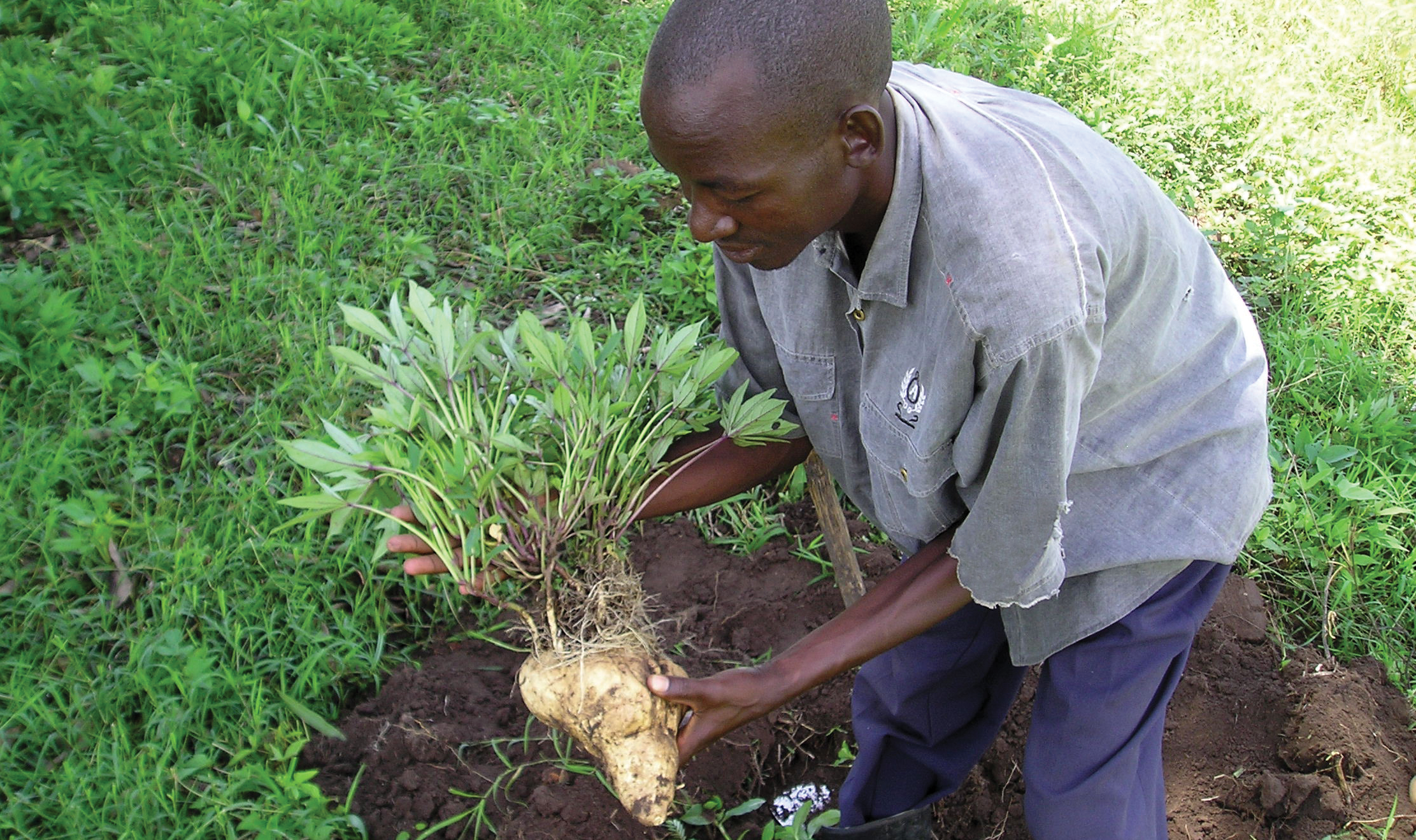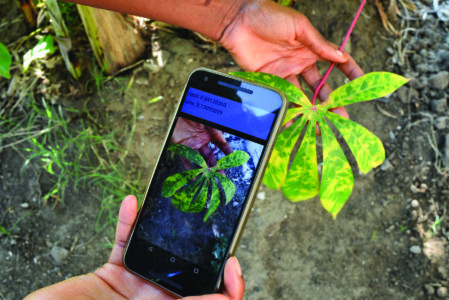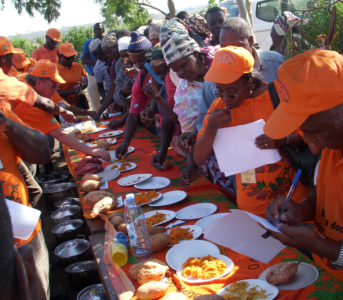
By disseminating quality planting materials of improved orange-fleshed sweetpotato varieties, the International Potato Center helps farmers increase yields, enhancing household food and nutrition security and incomes. The project goes further by delivering the knowledge farmers need to maintain and multiply their planting materials, thereby building foundations for future sustainability and resilience.

Background
Sweetpotato has huge potential to contribute to food security, nutrition and incomes throughout sub-Saharan Africa, but farmers need a ready supply of quality planting materials if they are to reap the full benefits. Scientists at the International Potato Center (CIP) have developed the ‘Triple S’ (storage in sand and sprouting) technology to help farmers maintain and multiply their own quality materials for early planting, higher yields and increased incomes.
Farmers select healthy roots and a suitable size container to store them in sand for up to four months. After storage, the roots can be sprouted to produce planting material for the next season. Triple S addresses the challenge of inadequate availability of seed at the start of the rains and produces clean planting material that is free from virus diseases and weevils. About 100 medium-sized roots can provide sufficient vines to produce five tons of orange-fleshed sweetpotato (OFSP) enough to meet a family’s annual vitamin A requirement.
With shorter and more unpredictable rainfall patterns, farmers can use Triple S to plant much earlier and take advantage of the whole growing season. The technology is complemented by Triple S PLUS: a package of recommended agronomic practices such as appropriate plant population, rapid multiplication, pest and disease management and harvesting methods, to increase sweetpotato root quality and quantity. CIP evaluations have highlighted that farmers using Triple S earn at least 14% more than using conventional methods.
Objectives
Scale up the use of Triple S PLUS in Ethiopia and Ghana through the introduction of a range of genderresponsive information and communication materials to promote uptake among farmers, extension agents, decision-makers in community-based organizations, international NGOs, and agricultural training institutions.
Approach
The project targets women farmers and resource-poor households in rural and peri-urban areas with an extended dry season. The selected countries have piloted Triple S and have commitment for co-investment from NGOs and government agriculture departments.
CIP and partner research institutions provide training of trainer courses on Triple S PLUS, with trainers establishing demonstration plots and supporting learning by community leaders, and Triple S champion households. They then disseminate the knowledge within their own communities. The training is supported by simple and attractive multimedia materials on Triple S and complementary agronomic practices, such as farmer handouts and community-based video dissemination for farmer to farmer training in local languages.
Attention is paid to ensure women fully participate and that messages and communication channels are tailored to specific audiences. Farmer-to-farmer learning is combined with radio programs to ensure broad multichannel communication. Reflection and learning with implementing partners is regularly undertaken and documented to provide useful case studies to guide further work.
Achievements
- Since November 2017, more than 1,500 farmers and extension staff (>32% women) in Ethiopia and Ghana received training, who in turn have trained other farmers. The ‘training of trainers’ and screenings of farmer-tofarmer training videos have reached nearly 75,000 farmers.
- Women valued Triple S for assuring an early supply of vines for planting, food and higher incomes by selling roots before the main harvest.
- In Ethiopia, small-scale seed producers using Triple S with low-cost pumps and integrated water harvesting:
-
- Earned on average USD 8,300/ ha, an increase of 121%
- Were also able to stagger the production and supply of OFSP roots, increasing the value of sales throughout the season.
- In Ghana, incorporation of OFSP and Triple S PLUS into courses taught at one agricultural college, with four others expected to follow.
- Farmer-to-farmer training videos has led to nearly 25,000 farmers in Ghana expressing an interest in purchasing sweetpotato vines.
Expected outcomes
The project expects ten actors to incorporate evidence from scaling models in the design and implementation of their agricultural development interventions. Members of the Sweetpotato for Profit and Health Initiative—a CIP-led multi-stakeholder partnership project to reach 10 million households across 17 Africa countries by 2021—will be key in scaling up dissemination.
International NGOs and government extension bodies promoting sustainable farmer-managed seed practices will piggyback Triple S PLUS onto their existing sweetpotato vine dissemination efforts. At the same time, partnerships with national institutions and international NGOs will ensure that the scaling effort is cost-effective through the use of existing organizational structures, staff and logistical capacity.
Key outcomes
| N° | |
| N°. of farmers achieving 90% net profit for root production from use of Triple S PLUS by 2022 | 100,000 (50% women) |
| % of target farmers in areas with extended dry season using Triple S | 30 (50% women) |
| % of target farmers achieving 30% increase in yields of sweetpotato roots | 20 |
| Trainers with capacity to use Triple S training and communication materials | 200 (50% female) |
Contact
Margaret McEwan
CIP, Kenya
m.mcewan@cgiar.org
Thanks to our donors



